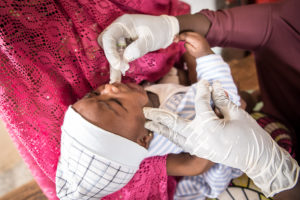Rotavirus is the most common cause of diarrheal disease among children. In fact, nearly every child who is not vaccinated will experience rotavirus at some point by age five. For children in countries without access to vaccinations and treatment, rotavirus can be fatal.
Rotavirus causes severe diarrhea, vomiting, fever, and abdominal pain and claims the lives of over 500,000 children every year, over 95 percent of which reside in low-income countries in Africa and Asia.
While the rotavirus vaccine (Rota) has provided protection for babies in countries like the United States for over a decade, many lower income countries still do not offer the vaccine as part of their national child immunization programs. By the end of 2016, only 25 percent of children in 73 of the highest risk countries received a full course of the Rota vaccine. Even once a country has made the decision to introduce the Rota vaccine, the time between the decision and when the first child receives the lifesaving vaccine can span years. This is typically caused by challenges with financing, vaccine procurement, and insufficient space in the vaccine refrigerators.
In response, CHAI has partnered with ministries of health in nine high-risk countries to accelerate the speed with which Rota (and other life-saving vaccines) are introduced and reach target coverage. CHAI, alongside other partners, has supported robust and detailed planning to ensure the new vaccine is seamlessly integrated into health programs. In order to make sure all children have access to Rota after the introduction, CHAI closely tracks immunization coverage, and monitors stock availability, supply chain functionality and how well healthcare workers are applying the guidelines and addresses any issues with government.
In December of 2017, CHAI celebrated the introduction of the Rota vaccine into the national immunization program in Lesotho, a small mountainous country surrounded by South Africa. CHAI worked with the Lesotho Government to plan and prepare for the Rota introduction, including training healthcare workers, updating data tools, and ensuring enough refrigerators were in place to store the vaccines. There were also community forums held to answer questions and educate the public about the importance of the vaccine and how and when infants should be brought to facilities for vaccination. CHAI is also helping ministries of health in Uganda and Nigeria with planned Rota introductions scheduled to take place this year (Uganda) and next (Nigeria).
A CHAI analysis shows that introducing Rota vaccine into national health programs will save the lives of more than an estimated 18,000 children every year in these three countries alone. The Rota introductions in these three countries, where over nine million babies are born each year, are possible thanks to financial support from Gavi, the Vaccine Alliance.
We have made great strides in the past few years to improve Rota access for low-income children across Africa, Asia and the rest of the world, but there is more work to be done. In countries that have not yet introduced the vaccine, parents who have heard about Rota may walk for miles to their local health clinics only to find that the vaccine is not available. Only wealthy families can afford to buy the vaccine from private clinics while those less fortunate are turned away empty handed.
As World Immunization Week comes to a close, it is a time to reflect and celebrate the progress that has been made. Immunizations save an estimated 2-3 million lives each year, but another estimated 19.5 million infants worldwide are still missing out on basic vaccines. As a global community, we must not be satisfied until all children, whether they live in rural villages or urban cities, are rich or poor, male or female, have equitable access to lifesaving vaccines like Rota and a better chance at living long healthy lives.






